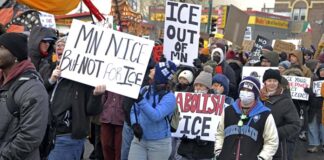The far-right Alternative for Germany (AfD) party has made major gains in Germany’s recent state elections—even as it moves in a more openly fascist direction.
In Thuringia on 1 September it won 32. 8 per cent, the most votes of any party. In Saxony the same day and Brandenburg on 22 September it came a close second to the mainstream parties with around 30 per cent of the vote.
Then in Austria the fascist Freedom Party came first in parliamentary elections at the end of September on 28.9 per cent of the vote. Far right and fascist parties are gaining momentum across Europe, such as Georgia Meloni in Italy and Marine Le Pen in France.
In June the AfD won the second largest share of votes in Germany’s EU election, behind only the conservative CDU. These results show the AfD has gained a worryingly rapid traction. In Thuringia they gained a huge 9.4 per cent boost on their previous share of votes.
The AfD bases itself around extreme anti-migrant racism, Islamophobia, climate change denial, and euro-scepticism.
Behind this far-right populism is an almost blatant neo-Nazism. AfD members of the Bundestag, Germany’s parliament, have described themselves as “the friendly face of National Socialism”, and leading AfD politicians such as Bjorn Hocke have used banned Nazi slogans in their election rallies.
The party was initially set up as “a mixture of fascists, right wing conservatives and neoliberals”, according to German anti-fascist and socialist Gabi Engelhardt. Now “the open fascists are determining its policy and are setting the tone.”
Earlier this year, leading members of the AfD attended secret meetings with neo-Nazis to discuss the mass deportation of migrants, including any German citizens with immigrant parents who have not “successfully integrated”. This policy, named “remigration”, was featured on their election campaign posters in Thuringia.
Its leader demanded a “stop to immigration, admission and naturalisation for at least five years”.
The AfD uses racism to scapegoat migrants and refugees for Germany’s cost of living crisis.
Energy and food prices have skyrocketed since Russia’s invasion of Ukraine, propelling inflation to its highest in 50 years. Wages haven’t kept up, and many are struggling to afford necessities like housing.
The ruling coalition of the Social Democratic Party, Greens and the Free Democratic Party has refused to provide relief. Instead, Chancellor Scholz has pledged $160 billion to expand the German military, and has committed to sweeping cuts to social services in order to fund it.
The AfD has exploited widespread disillusionment in order to build support.
Their largest supporter base, for example, is in the East of Germany, where workers are on average poorer and more vulnerable to the cost of living crisis, and among the most disenfranchised from the ruling parties.
Legitimising racism
The response from the political establishment has been to warn against the extremism of the AfD. But the mainstream parties are also pumping out racism, legitimising what’s coming from the AfD.
Scholz last year declared that, “We have to deport people more often and faster.” Just before the elections in Thuringia, Scholz deported 28 refugees to Afghanistan, some for as little as a drug possession conviction.
The “left alternative” parties in Germany have offered little resistance. Die Linke, previously the largest party in Thuringia, has been silent on the state’s repression of pro-Palestine activism, and even voted with the government to ban a Palestine solidarity conference. They have dutifully lined up behind Scholz’s government in supporting the huge expansion of Germany’s military and the arms shipments to Ukraine.
A section of Die Linke around Sahra Wagenknecht has also splintered off to form an “anti-migrant, pro-worker” party designed to appeal to those who accept the racism of the AfD.
But when the left and the centre cedes ground to racism and Islamophobia, it only makes the far right seem more acceptable.
There have been promising protests against the rise of the AfD across Germany. To fight the far right, we need to mobilise against this racism head on.
This also requires pointing the finger clearly at the policies of the German government as responsible for the economic crisis that workers are suffering, instead of the refugees who are its most brutalised victims.
This includes demanding an end to the arms shipments and militarisation which is fuelling the devastation of Ukraine, Gaza and Lebanon, at the cost of spending on public services. The anti-racist movement must be connected to support for Palestine—a particular issue in Germany where there has been hostility to pro-Palestine contingents on the large marches against the AfD.
This requires building a genuine left that can take up the fight against racism and fascism, as well as the economic misery and imperialism that breeds it.
By Maeve Larkins






